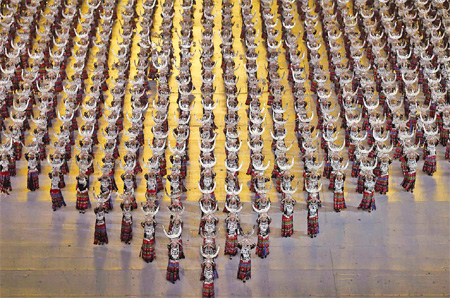Industrialize, yes - if it's rational
 0 Comment(s)
0 Comment(s) Print
Print E-mail
China Daily, September 14, 2011
E-mail
China Daily, September 14, 2011
 |
|
A synchronized performance by 2,000 Miao ethnic women was one of the highlights of the opening ceremony of the National Ethnic Games. Photos by Wang Jing / China Daily. |
Guizhou is an agricultural province in a mountainous part of southern China that suffers from water shortages and its economic growth lags far behind that of coastal regions in the East, so the local government is giving priority to economic development.
In recent years, it has engaged in endless debates over how best to develop the province's economy in a more scientific way.
There was controversy and many opinions, but the provincial government insisted on growth that balanced industrialization and ecological preservation. Some international observers have applauded its efforts and have said they believe it will pay off in future.
This led to the Eco-Forum Guiyang (EFG), in July, as a way to look for a good approach to synchronous development for civilization and industrialization. It drew more than 600 scientists and officials, many of them from abroad.
One of them, Axel Preusse, a German environmental specialist, told the summit that, "Industrialization must come first."
Preusse explained that he is from Neue Ruhr, an old industrial part of Germany with many coal mines and factories, but, "Now it's been transformed into a very modern city."
Zhao Kezhi, the governor of Guizhou, told the participants that his government will stick to its plan of establishing an eco-society while it improves the economy and added, "Advanced industrialization is welcome to explore resources and boost the economy in a rational way."
Zhao explained that, "Guizhou lacks land and fresh water and is a less-developed, mountainous province with a low rate of development and a large impoverished population. We need not only to be efficient, but also to narrow the gap between us and other developed regions."
According to Li Zhanshu, Guizhou's Party chief, local leaders need "a sustainable economy and social development, while narrowing the enormous development economy gap".
Li also said that local authorities proposed accelerated development and a speedy transformation as the main goals of self-development.
"We should have a strategy that turns us into an industrial province while urbanizing."





